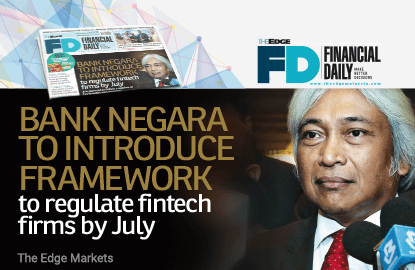
This article first appeared in The Edge Financial Daily, on May 27, 2016.
KUALA LUMPUR: Bank Negara Malaysia (BNM) will be introducing a framework to regulate the fintech (financial technology) industry by July.
“We want to issue it by July this year so that banking institutions have time to look at and give us comments so that it will be effective when it comes to implementation,” BNM Governor Datuk Muhammad Ibrahim told reporters on the sidelines of the 20th Malaysian Banking Summit yesterday.
In his opening keynote address earlier, he said the central bank expects the framework to deliver a number of key benefits and will provide regulatory clarity for fintech start-ups, and for banks and consumers that use their services.
“It will also lower barriers to entry and accelerate the time-to-market for productive innovations. Our aim is therefore to support fintech firms that go on to upscale their activities, and aid fintech firms to better anticipate and adjust to appropriate regulatory expectations,” he said.
Muhammad pointed out that the introduction of the framework will enable fintech firms to provide regulated financial services directly to the public, or with partnerships with financial institutions under a more flexible regulatory environment.
“We take cognisance that some innovations cannot be achieved within existing regulatory parameters. Nonetheless, to protect the interests of consumers, this will be subject to certain safeguards. The innovation must provide a clear benefit to the general public or financial industry,” he said.
The governor also said a firm that operates within the framework must also commit to observe reasonable standards of service, transparency to customers, appropriate funding and reporting requirements.
“These are not meant to stifle the creative process at play, but rather to facilitate an orderly process while protecting consumer interests and maintaining market confidence,” he explained.
“Over the years, banks have harnessed the power of technology to reap significant benefits. Bank Negara has supported this development on many fronts including in the areas of payments, Internet banking, agent banking, Islamic finance, and money exchange and remittances. Fintech will be a new addition to the list,” he added.
He noted that fintech developments such as blockchain, artificial intelligence and biometric applications are now expanding the frontiers of banking.
“Because of the profound implication of new technology, we require a rethink of the regulatory framework in addressing consumer protection and market conduct issues as well as the technological impact on the orderly functioning of financial markets.”
Meanwhile, Tan Sri Azman Hashim, the chairman of Asian Institute of Chartered Bankers, noted in his introductory speech that up to 10% to 40% of the banking revenue will disappear by 2025, as fintech is challenging the status quo of the financial industry.
“Most countries are looking at fintech. In fact, Bank Negara is one of the early ones to come up with this [framework] for fintech. The industry is looking forward to it because we want to be part of it, inside it.
“According to what the governor [has] said, he is trying to give the financial industry the first go at it,” he later told reporters.
Earlier this month, Muhammad said at the Global Islamic Finance Forum 5.0 that Bank Negara has been actively engaging with fintech firms to better understand their activities and provide guidance on the regulations that may apply to them.
He had also noted that the adoption of fintech is “clearly not without risks”, particularly in the wake of rising cybersecurity threats that could compromise safeguards that protect financial assets and customer data.
Fintech, by definition “is a line of business based on using software to provide faster and cheaper financial services, and fintech companies are generally start-ups founded with the purpose of disrupting incumbent financial systems and corporations.